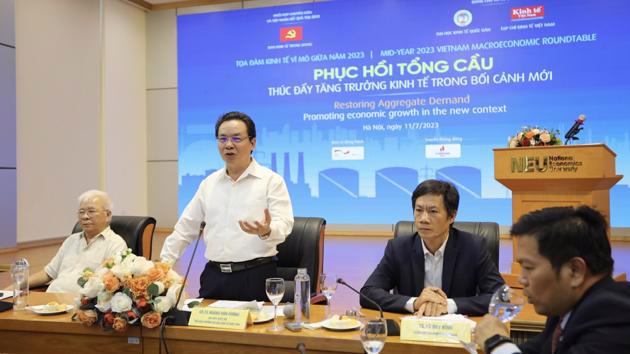Vietnam’s economy needs effective solutions to restore its declining aggregate demand, which would promote economic growth over the closing months of the year, analysts told the Mid-year 2023 Vietnam Macroeconomic Roundtable, with the theme “Restoring aggregate demand: Promoting economic growth in the new context”, held on July 11 by Tap chi Kinh te Viet Nam / VnEconomy / Vietnam Economic Times (VET) and the National Economics University (NEU).
In his opening address, Dr. Chu Van Lam, Editor-in-Chief of VnEconomy / VET, said the roundtable will be an open, frank, positive, and useful discussion between representatives from management agencies, policy-making bodies, analysts, stakeholders, international partners, industry associations and corporations, and domestic and foreign enterprises.
Opinions will be forwarded to the Party Central Committee’s Economic Commission for the preparation of macro-economic assessment reports and used as a reference source in the process of developing orientations and socio-economic development policies.
According to economic analysts, based on figures as well as the many positive signs in recent months, inflation in 2023 should be contained at less than 4.5 per cent. However, it will be challenging for Vietnam’s economy to reach the 6-6.5 per cent GDP growth target for the year.
The roundtable aimed at evaluating the results as well as the shortcomings and limitations in Vietnam’s economic growth, inflation control, and macro-economic stability in the first half of 2023, and at assessing aggregate demand in the new context. Based on these evaluations, the panel will propose a number of macro-economic tasks and solutions over the second half of 2023 and in the medium and long terms, in order to help Vietnam’s economy regain its growth rhythm and achieve the plans and goals set out at the beginning of the year.

Professor Hoang Van Cuong, Member of the National Assembly, Vice President of the NEU, and Member of the National Assembly Finance-Budget Committee, highlighted the relationship between aggregate demand and economic growth, which has long been taken into consideration. Further consideration is needed, however, given that the economy is growing slowly even though production inputs in the first half were much better than last year, a fact caused by an imbalance in aggregate demand.
According to Associate Professor Nguyen Thanh Hieu, Vice President of the NEU, many figures reveal a sharp decline in aggregate demand in Vietnam’s economy. The country recorded a trade surplus of $12.25 billion in the first half, but both export and import turnover were down sharply year-on-year, by 12.1 per cent and 18.2 per cent, respectively, due to lower demand in Vietnam’s main markets, such as the US, ASEAN, the EU, and some East Asian countries.
“The target of 6.5 per cent GDP growth in 2023 will be very difficult to reach in the context of unpredictable impacts from the world, while the domestic manufacturing sector has not fully recovered from the pandemic,” he said. “This requires that the government and relevant ministries, departments, and agencies urgently take appropriate and timely measures to restore aggregate demand and develop the economy in the new context.”
In his presentation on Global Economic Prospects and Implications for Vietnam, Professor Jonathan Pincus, UNDP Senior Economist, noted that global economic recovery has stalled and will remain sluggish, high inflation and rising interest rates have created conditions for a balance sheet recession as households, firms, and banks adjust to more expensive financing and falling asset prices, and China will not be the source of demand of last resort, as it was in 2009.
Vietnam is relying heavily on monetary policy to stimulate demand, he said, noting that a relaxation of lending standards and lower interest rates reduce asset quality and create asset bubbles. Under-utilization of fiscal policy tools slows demand growth during downturns and is inflationary during periods of expansion, as fiscal policy is procyclical. Furthermore, the underuse of fiscal policy tools slows demand growth in downturns and is inflationary in upswings.
Therefore, Vietnam needs more effective fiscal policy instruments, specifically in fragmented and efficient public investment linked to industrial and trade policy, and a public sector climate bank, with private participation, to increase the supply of long-term finance for the country’s energy transition. The social assistance and security system also needs to be expanded and modernized, Professor Pincus emphasized.
Meanwhile, Ms. Dorsati Madani, Senior Economist at the World Bank (WB), said that the global economy continues to face diverse and overlapping risks, such as financial stress, geopolitical issues, natural disasters, continued monetary tightening in many countries, food and energy security, longer-term growth prospects being weaker, prolonged high inflation, social tensions, and fragmented global economic networks.
The driving forces of global economic recovery in the opening months of 2023 are expected to decline over the closing months. This suggests a slowdown in global economic activity for the year, reflecting a marked deceleration in advanced economies. Global growth is forecasted by the WB to reach 2.1 per cent in 2023 and 2.4 per cent in 2024.
Declining aggregate demand has directly impacted Vietnam’s economy, she noted. Its growth momentum has slowed significantly in the first two quarters of 2023. The WB forecasts that GDP will fall below 5 per cent this year and then pick up to around 5.5-6 per cent in 2024.
In order to overcome the challenges and promote economic growth, Ms. Madani urged Vietnam to act immediately. She suggested four main solutions: fiscal policy, monetary policy, reforms to support economic growth in the medium term, and strengthening faith in such reforms.
In his concluding remarks, Dr. Nguyen Duc Hien, Deputy Head of the Party Central Committee’s Economic Commission, agreed with comments from analysts that this is a difficult and important time for Vietnam’s economy. “It is necessary to adopt an approach to develop policies, while practical and effective solutions need to be introduced immediately,” he said. “Opinions from domestic and international analysts, ministries, and sectors will be received by the Party Central Committee’s Economic Commission to serve the preparation of a macro-economic assessment report.”









 Google translate
Google translate